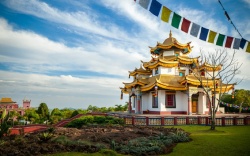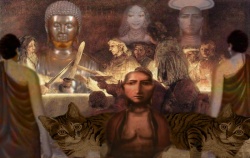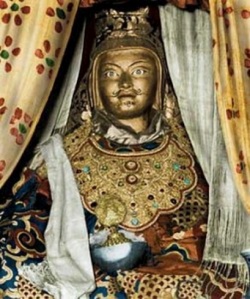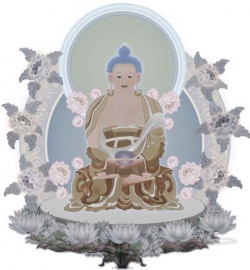Difference between revisions of "Bindu Visarga"
| Line 28: | Line 28: | ||
| − | [[Bindu]] Visarga's [[physical]] position is a point just inside the scalp at the back of the head where the [[Hindu]] [[Brahmins]] (and some other [[religious]] {{Wiki|adherents}}) wear a tuft of [[hair]]. This point can be exactly discerned by certain [[meditation practices]], namely those of [[Nada]] [[Yoga]] (see [[Bhramari]] [[Pranayama]]) and [[Kriya Yoga]] (see [[Vipareet Karani Mudra]]). | + | [[Bindu]] Visarga's [[physical]] position is a point just inside the scalp at the back of the head where the [[Hindu]] [[Brahmins]] (and some other [[religious]] {{Wiki|adherents}}) wear a tuft of [[hair]]. |
| + | |||
| + | This point can be exactly discerned by certain [[meditation practices]], namely those of [[Nada]] [[Yoga]] (see [[Bhramari]] [[Pranayama]]) and [[Kriya Yoga]] (see [[Vipareet Karani Mudra]]). | ||
| Line 44: | Line 46: | ||
| − | Any [[bindu]] is like a doorway to another [[realm]] and [[Bindu Visarga]] is likened to a doorway into the | + | Any [[bindu]] is like a doorway to another [[realm]] and [[Bindu Visarga]] is likened to a [[doorway into the divine realms] of existence]]. |
| + | |||
| + | |||
| + | It is the portal through which all things [[manifest]] and through which the [[meditator]] can return to the source. | ||
| + | |||
| + | In one [[direction]], [[oneness]] takes [[form]] into the [[duality]] of {{Wiki|matter}} and [[consciousness]], and in the other [[direction]] all [[dualisms]] are dissolved into the [[oneness]]. | ||
| + | |||
| + | For [[parents]], who have the [[belief]] that they are not really the creators of their children but are only the vehicles, caretakers and guides for their evolutionary journey, such [[ideas]] will be already familiar. | ||
| − | + | For those who have not yet considered this {{Wiki|concept}}, a [[gradual awakening]] through [[yoga]] and [[meditation]] practise will certainly help to develop this [[understanding]]. | |
Revision as of 06:27, 8 December 2015
Meaning and Symbolism
Bindu Visarga is not a chakra at all but a state of existence from out of which the chakras themselves evolve. It is more like an intermediary realm between Ajna Chakra and Sahasrara (see following). It represents a point even beyond yoga where finite and infinite meet.
The term Bindu literally means "to divide", and Visarga means "falling".
So Bindu Visarga variously means a falling drop, the place of division from the whole, a point of separation or creation, a seed, or a sperm - but not the egg.
In the yogic scriptures two Bindus are de-scribed. The white Bindu is Shiva's semen (or ojas) which falls from out of the moon.
The red Bindu is Hiranyagarbha, the cosmic egg or womb of Shakti, which comes from out of the sun. The union of these two causes worldly creation as well as human enlightenment.
Bindu Visarga is the source of the divine nectar (previously described) which drips to Vishuddhi Chakra. This nectar comes from the supreme state of Sahasrara.
Its yantra depicts the full moon, which is just a tiny point source of light against the infinite night sky or shoonya (the infinite emptiness leading to enlightenment).
The crescent moon represents the unfolding phases of our spiritual realisation and movement towards the infinite.
Location
Bindu Visarga's physical position is a point just inside the scalp at the back of the head where the Hindu Brahmins (and some other religious adherents) wear a tuft of hair.
This point can be exactly discerned by certain meditation practices, namely those of Nada Yoga (see Bhramari Pranayama) and Kriya Yoga (see Vipareet Karani Mudra).
Bodily Systems
There are no bodily systems or organs governed by Bindu Visarga.
Self Expression
Any bindu is like a doorway to another realm and Bindu Visarga is likened to a [[doorway into the divine realms] of existence]].
It is the portal through which all things manifest and through which the meditator can return to the source.
In one direction, oneness takes form into the duality of matter and consciousness, and in the other direction all dualisms are dissolved into the oneness.
For parents, who have the belief that they are not really the creators of their children but are only the vehicles, caretakers and guides for their evolutionary journey, such ideas will be already familiar.
For those who have not yet considered this concept, a gradual awakening through yoga and meditation practise will certainly help to develop this understanding.
I went inside a tiny point.
Such a little door -
But such a big room beyond
Source
https://www.healthandyoga.com/html/readingroom/mafg/mafg66.aspx



